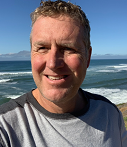Find Your Community
By Peter A'Hearn, President
Do you have a community?
I mean a science education community. A group of people who are positive about teaching kids, who share ideas and inspiration, people who give energy to your teaching?
Maybe your community is where you teach. I’ve been lucky to be part of a science teaching staff that was a great community. The department chair modeled high expectations for learning. There was a sign on the wall that said, “Every Day Share The Wonders of the Universe,” and that’s what we aimed to do. We helped each other set up labs, shared good ideas relentlessly, and supported new teachers. The science team had its own lounge where some of the teachers from other departments would come have lunch to escape the negativity that sometimes infected the main staff lounge.
I’ve also been in schools with no sense of community. Schools where everyone hid supplies in their rooms and claimed them as their “stuff.” Places where the attitude toward new teachers was “Why bother helping them? They probably won’t last anyway.” Schools where I felt like I needed to take a shower to wash off the negativity in the lunchroom. A lack of community makes it hard to feel truly professional.
If you aren’t lucky enough to have a great community at your site, where can you find your connections? I know there are many passionate science educators who don’t have a strong team at their site. Rural teachers and teachers at small schools might be the only science teacher at the school. Often at an elementary school there are only a few teachers who care deeply about science, and the administration views science as a distraction from test scores. Or you might be part of a staff where everyone guards their territory and working together isn’t a priority.
As my career advanced, I found there were other larger communities that I needed to connect to to keep learning and growing. These were CASE (then CSTA) and the K-12 Alliance. These communities helped me access ideas and energy from around the state and beyond. I’ve made good friends and always look forward to the next meeting or conference and the inspiration I will gain.
If you need a community, or have a community, but also want to connect to a wider network, then CASE is there for you. COVID has made it hard to meet in person, but has forced us to invent new ways to meet. The virtual conference last year was a great place to connect across the state. It gave teachers who normally can’t attend the conference, due to time or money, a way to participate. This year’s virtual experience in October promises to offer more of the same.
Once a year just isn’t enough. That’s why CASE will also be hosting smaller regional meetings around the state to meet face to face and share our best ideas. Returning to school after a pandemic is something that nobody is an expert at. You are the experts and need opportunities to learn from each other!
Last year, CASE hosted a series of webinars on environmental literacy, teaching science to language learners, and managing stress and building resilience. Look for more in the coming year. To access the recorded version of the webinars, members can go to the CASE Learning Community.
In addition, CASE hosts Facebook groups for High School, Middle School, Elementary School, District Coaches, Administrators, and University Science Education Faculty. These are places to make connections, ask questions and share ideas around the state.
CASE also has Member Circles, which is a social network available only to members. There are circles for Mentors and Mentees, Elementary Teachers, Preservice teachers and many more. Log in to your member portal to access the Circles today!
To really be part of a community you need to be involved. Present at a conference or join a CASE Committee to work on something you are passionate about. We have committees on Career Technical Education, Environmental Literacy, NGSS, Diversity, Equity and Inclusion, Policy, Legislative Action, Publications, Social Media and many more!
Wherever you teach science, a community makes you stronger. You need a community. Let CASE help you find it.






